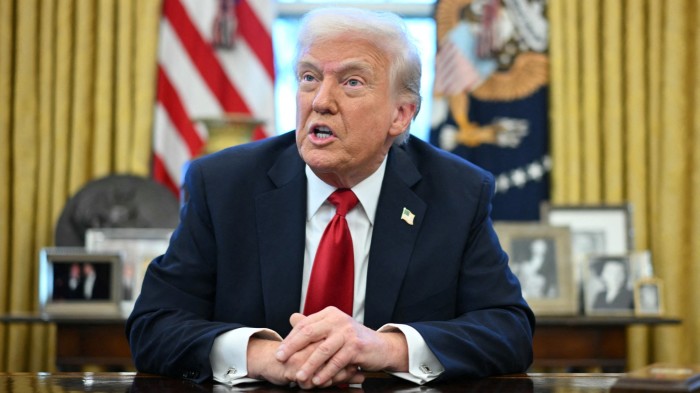Good morning, happy Friday and welcome back to FirstFT Asia. In today’s newsletter we’re covering:
-
Chaos in the car industry
-
A ruthless bonus day at HSBC
-
Geopolitical competition over Canada’s Arctic frontier
The global car industry has been thrown into turmoil by Donald Trump’s decision to impose 25 per cent tariffs on imports of foreign-made cars and parts. The move was the US president’s most aggressive trade policy move to date.
Global reaction: Asian, European and North American countries warned of possible retaliation. French finance minister Eric Lombard attacked the US for “completely shifting its economic policy” and said “the only solution for the EU will be to raise its own tariffs on American products”. Japan’s Prime Minister Shigeru Ishiba said “every option” was under consideration while South Korea promised an emergency response.
‘Devastating’ consequences: It quickly became clear that every carmaker, including Tesla and the US Big Three of General Motors, Ford and Stellantis, would be affected.
Almost half of vehicles sold in the US are imported, while those assembled in the US on average source nearly 60 per cent of their parts from overseas. Bernstein analysts said the policy could introduce up to $110bn in annual tariff costs for the carmakers. The tariff policy, which analysts and investors have described as “a worst-case scenario”, “heavy-handed” and “devastating”, is unparalleled in its reach and scale.
The tariffs are intended to boost US industry but shares in Ford and GM fell as much as 4.4 per cent and 8.2 per cent respectively yesterday morning in New York.
What comes next: The tariffs will take effect from April 2, alongside reciprocal levies against US trade partners that are expected to be unveiled on the same day. Market research company Cox Automotive predicted that the confusion in the supply chain would lead to vehicle production in North America being disrupted by mid-April, resulting in US plants making 20,000 fewer vehicles per day, or about 30 per cent less than now.
Here’s what else we’re keeping tabs on today and over the weekend:
-
Economic data: Japan reports trade statistics while Canada and the UK release GDP estimates.
-
Greenland: US vice-president JD Vance is set to visit an American military base in Greenland today, as Washington its pressure on the geopolitically crucial island.
-
Results: PetroChina, Industrial & Commercial Bank of China and China Construction Bank report full-year 2024 results today.
-
US-Japan relations: Trump’s defence secretary visits Japan for high-level talks on Sunday, which could cover whether Tokyo will raise its planned spending on defence.
How well did you keep up with the news this week? Take our quiz.
Five more top stories
1. HSBC fired bankers on the day they were due to learn their bonus figures and gave no bonuses to many it let go. The move, which affected some staff at vice-president level and above in its UK investment banking unit, is a sign of how the lender is taking a more ruthless approach to costs under new chief Georges Elhedery.
-
More financial news: Private credit is “not a bubble”, Apollo Global Management president Jim Zelter said at an event in Hong Kong yesterday. Read more of Zelter’s comments.
2. Chinese financial authorities have told some companies and advisers that they can begin the process of launching mainland initial public offerings once more, in an early sign of a rebound in listings in the country’s economy. Groups in the technology, advanced manufacturing and consumer sectors have been told in the past few weeks that they can file IPO paperwork. Here’s why Beijing has shifted its approach to listings.
3. The US is pushing for a sweeping new deal to control Ukraine’s critical minerals and energy assets, while offering Kyiv no security guarantees in return. The new draft deal seen by the FT is an aggressive expansion of Washington’s previous demands, as Trump pushes to end Russia’s invasion of Ukraine and recoup billions of dollars’ worth of military assistance.
4. TSMC’s pledge to spend $100bn will do little to help the US restore its global lead in chipmaking, said former Intel chief Pat Gelsinger. While Taiwan Semiconductor Manufacturing Company announced plants in the US recently, its research and development was still in Taiwan, he said. “If you don’t have R&D in the US, you will not have semiconductor leadership in the US.”
5. The US’s federal debt burden is set to surpass the peak it reached in the wake of the second world war in coming years, Congress’s fiscal watchdog has warned. The projections underscore growing concerns over America’s public finances and come just days after Moody’s delivered a warning about the sustainability of the country’s fiscal position.
News in-depth
The Trump administration’s cuts to the federal workforce are raising worries over the quality and credibility of US economic data. Economists are concerned that Elon Musk’s cost-cutting drive will undermine officials’ ability to collect, analyse and research statistics on the world’s biggest economy, dealing “a death blow to already very stretched survey operations”.
We’re also reading . . .
Map of the day
Canada’s Arctic frontier — an inhospitable tundra 200km north of the Arctic Circle — is emerging as the new frontline in a geopolitical contest with the US, Russia and China. The region’s increased accessibility as a result of climate change and Trump’s expansionist rhetoric are putting it higher on Canada’s military agenda.
Take a break from the news . . .
Heathrow’s chief executive reportedly knocked off at 12.30am last Friday to go to bed, leaving his deputy to decide whether to close the UK’s biggest airport after a fire broke out at a nearby power substation. The decision to step away received some criticism — but do CEOs always need to be on duty to do a good job? Read Emma Jacobs on the power of sleep in a crisis.
Read the full article here

